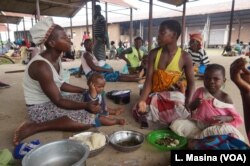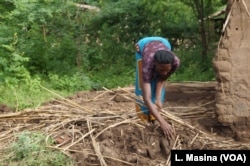Some 200,000 people in Malawi have been displaced by floods that have affected half of the country’s 28 districts. The government has recorded at least 56 deaths and over 500 injuries, as of Wednesday. Forecasters have warned that more rain is on the way.
Many of those affected are in evacuation camps because of floods that have destroyed their houses, damaged roads, washed away bridges and killed livestock.
Weather experts say the flooding was a result of a tropical cyclone that blew in from neighboring Mozambique.
MacDonald Clemence, one of the victims, said it was at midnight while he was fast asleep when he was awakened by the sound of something falling down with a thud. He immediately woke others and found that it was a wall of their house, and immediately sought refuge at a chief’s house until the following morning when they were told to stay at camp set up in Nsanje.
The roaring water which entered his house swallowed almost everything he had, but he managed to escape with his two children.
He said they are now hoping to receive food and blankets, and arrange a place in the upper land where to resettle.
Malawi President Peter Mutharika has declared the 14 affected districts disaster areas and issued an urgent appeal for help.
But the delivery of relief items that have started to trickle in is being hampered by flooded roads.
Francis Kadzokoya, a disaster risk management officer, said many relief items might have to be delivered by air.
“Probably we would want to call upon our mother department to help us with a helicopter so that we should be airlifting some of the relief items to the camps which cannot be accessed by the road,” said Kadzokoya.
Meanwhile, community health workers have been deployed in the camps to treat those in need of medical care and advise people on practices that help prevent outbreaks of infectious diseases.
Bram Makawi, a senior disease control surveillance officer in the Ministry of Health, said efforts are underway to prevent ailments like malaria, pneumonia, diarrhea and eye infections.
Similar floods in southern Malawi four years ago killed 276 people and displaced 230,000 others.
Kadzokoya said the government is now planning to start relocating people from flood-prone areas to higher ground.
“I think we would actually do away with the aftermath of these serious disasters like the one we experienced in 2015, and even these we have just experienced in March 2019.”
However, forecasters have warned of another week of steady rain starting March 14 in parts of southern and northern Malawi. The rains are likely to cause more flooding.


